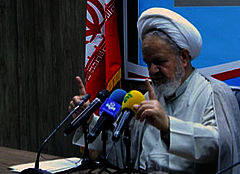Khamenei’s Rep.: We Will Not Intervene; Only Call for Votes to the Religious
» Rev. Guards Anxious Over Upcoming Elections
Last week the representative of Iran’s supreme leader in the Revolutionary Guards Corps (IRGC) expressed his concerns about the possibility of a change in the composition of parliament after February’s elections to the disadvantage of the current conservative-hardline majority. This week he responded to president Hassan Rouhani’s warning that “other forces and para-government” entities should not interfere in the elections and asserted, “We do not wish to interfere in the elections and only say that people should vote for the religiously committed.”
Cleric Ali Saeedi who represents ayatollah Khamenei in the Revolutionary Guards was participating at a gathering titled, “Clerics in the Guards” when he spoke of the importance of the February Majlis and then the Assembly of Experts on Leadership elections. “In the Guards, everybody must act within the confines of the central command, otherwise their presence in the force is not justified. In ‘political operations’ the necessary requirement is to keep the unity of the ‘central command,’” he said.
While Saeedi did not elaborate on his term “political operations” that he used for the upcoming parliamentary and Assembly of Experts elections, but his remarks that “… we ask that people vote for the religiously committed” and “Our votes are effective and they want to take that away from us” is a clear reference to how the force expects to influence voters.
He continued with his remarks by saying, “Our opponent has an unwritten agreement to vote for those have the steepest angle with the regime” and then warned, “our revolution would not fall into the hands of ‘others’ if Majlis representative remain religiously dedicated and revolutionary while members of the Assembly of Experts on Leadership remain wise and religiously dedicated.”
Saeedi also talked about the role of paid clerics in the IRGC and said, “Being the manager of an organization does not mean that we clerics must abandon our clerical activities. Preaching and praying should not be put to rest. I will confront such situations if I see them. Today we have been given the responsibility of managing a number of agencies such as the ministry of intelligence, the state-run national radio and television organization, the Islamic Propagation Organization, and the Guardians Council from inside the Revolutionary Guards. This is because they cannot officially get into the IRGC and do their job.”
These and other similar remarks appear to be a response to what president Hassan Rouhani had said earlier that the government was not to support any political faction in the upcoming elections. “Whit it is right for the government not to intervene in elections, this does not mean that other powerful forces and para-government entities should intervene by supporting a specific political group or groups.” He was even more specific when he said, “We do not want to hear (some people claim) that the government, the Revolutionary Guards, the state-run national radio and television organization, governors, or Friday imams have supported a certain political faction. This is poison for elections. All senior officials and authorities of the state must behave in a manner that does not bring such accusations against them.”
During prior elections, the representative of ayatollah Khamenei had expressly talked about “reasonable engineering” and “responsible intervention” by the IRGC in presidential elections. Today, the words have changed but the concern remains. In a prior interview, Saeedi had said, “Many efforts are made to transform the revolutionary Majlis to something else. This is a danger facing Khomeini’s ideals and the interests of the regime. The Guardians Council has a duty in this regard and must introduce criteria for the candidates so that people vote for candidates who pursue the ideal principles of the supreme leader.”


